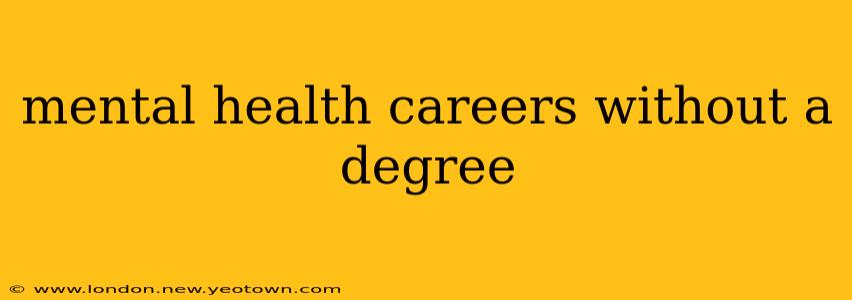Charting Your Course: Thriving Mental Health Careers Without a Degree
The path to a fulfilling career in mental health doesn't always require a four-year degree. Many rewarding roles offer significant impact and personal satisfaction, even without a bachelor's or master's. This isn't to say the journey is easy; it takes dedication, hard work, and a genuine passion for supporting others' well-being. Let's explore some viable options and address common questions.
What are some mental health jobs that don't require a degree?
This is a question many aspiring mental health professionals ask. Fortunately, several entry-level positions offer valuable experience and contribute significantly to the field. These often involve direct support, administrative tasks, or specialized training programs. Examples include:
-
Peer Support Specialist: Sharing your lived experience with mental illness can be incredibly empowering for others. Peer support specialists provide empathy, encouragement, and practical advice based on personal understanding. Training programs often exist within community organizations or mental health facilities, equipping you with necessary skills.
-
Residential Counselor/Caregiver: Residential facilities for individuals with mental health challenges require dedicated caregivers. Responsibilities range from daily living assistance to monitoring medication and ensuring a safe and supportive environment. On-the-job training is typical, but a compassionate nature and strong communication skills are essential.
-
Certified Nursing Assistant (CNA) in a Mental Health Setting: While requiring certification, not a degree, CNAs in mental health settings play a crucial role in basic patient care, observation, and communication with nursing staff. This provides valuable insight into the complexities of mental health treatment.
-
Administrative Assistant in a Mental Health Clinic: Behind-the-scenes support is vital for any clinic's success. Administrative assistants manage schedules, handle paperwork, and provide essential organizational support, contributing indirectly but significantly to the overall well-being of patients.
What kind of training is needed for mental health careers without a degree?
Training varies depending on the specific role, but several common threads unite these pathways. Many positions value:
-
Certified Peer Support Specialist Training: These programs provide foundational skills in communication, active listening, crisis intervention, and self-care.
-
First Aid/CPR Certification: Especially relevant for roles involving direct patient care, these certifications ensure the safety of both the individual and the caregiver.
-
On-the-Job Training: Many employers offer extensive on-the-job training, particularly in roles like residential care.
-
Specialized Workshops and Seminars: Continuous learning is key. Attending workshops on specific mental health challenges or therapeutic techniques can significantly enhance your skills and broaden your understanding.
Can I get a promotion or move to a higher paying mental health job without a degree?
Absolutely! While a degree might open more doors, dedication and skill can lead to advancement within a chosen role. Demonstrating reliability, initiative, and a commitment to professional development will showcase your potential for growth within the organization. Consider further training to upskill, and network effectively with colleagues and supervisors to highlight your achievements and aspirations.
How can I find mental health jobs that don’t require a degree?
Online job boards (Indeed, LinkedIn, etc.) are great starting points. Search for keywords like "peer support," "residential counselor," "mental health aide," or "behavioral health technician." Directly contacting local mental health organizations, hospitals, and community centers can yield significant results. Don't underestimate the power of networking—talking to people in the field can lead to unexpected opportunities.
What are the limitations of pursuing mental health careers without a degree?
It's crucial to be aware of potential limitations. Without a degree, career progression to roles requiring advanced clinical skills (like therapy) might be restricted. Salary potential might also be lower than those with higher education. However, this shouldn't discourage you; many fulfilling and impactful careers thrive without a degree.
The journey to a mental health career without a degree is a testament to dedication and passion. While challenges might arise, the reward of making a difference in someone's life makes it a profoundly worthwhile path. Remember to research, network, and commit to continuous learning – your impact on the mental health landscape can be significant, regardless of your formal education level.

